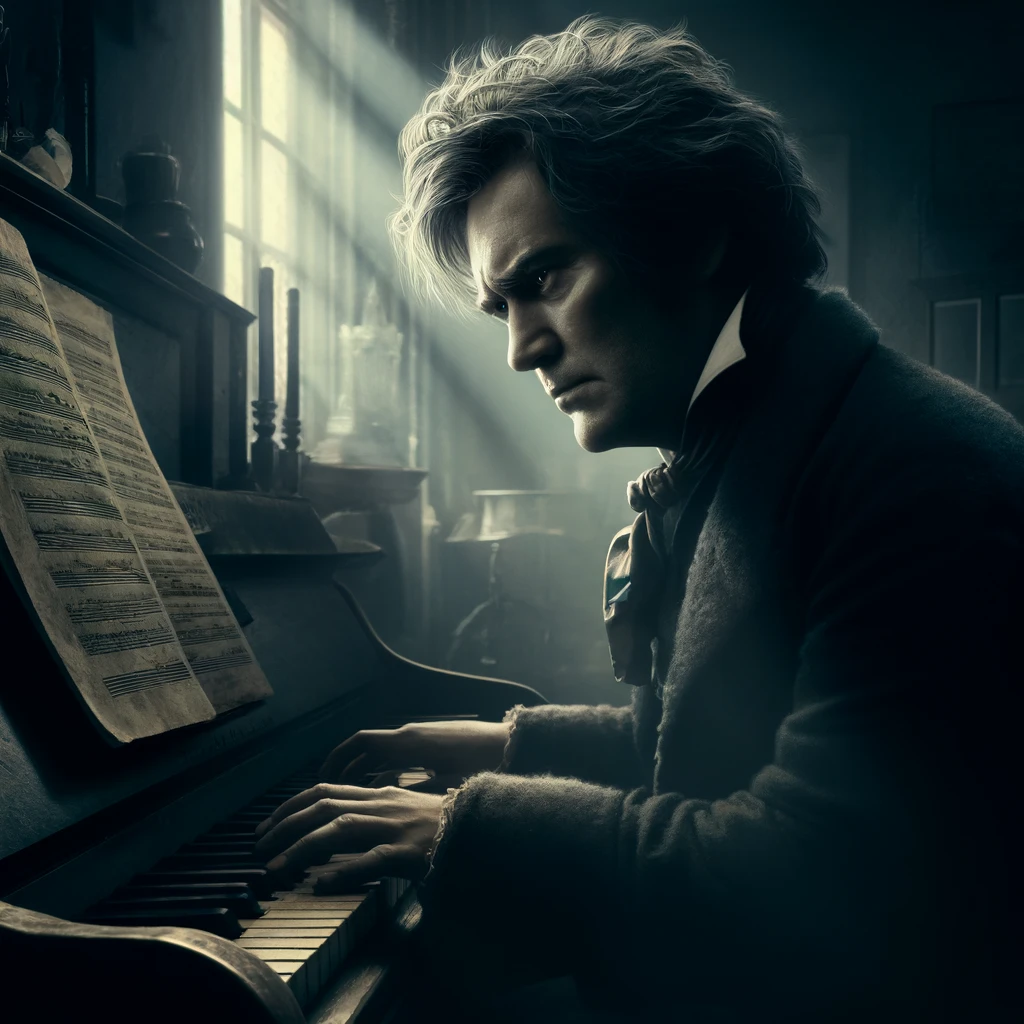
Beethoven’s Triumph: His Music in the Shadow of Deafness
Ludwig van Beethoven, a name synonymous with musical genius, faced a battle that seemed almost insurmountable for a composer: deafness. His journey from a prodigious talent to a figure of timeless reverence is not just a story of musical mastery, but also of extraordinary resilience.
The Early Years of Promise
Beethoven’s early life in Bonn, Germany, was marked by a mixture of turmoil and triumph. Born in 1770, he quickly exhibited signs of musical genius, honed under the stern guidance of his father, Johann. Despite a challenging home life and a less than ideal education, Beethoven’s talent was undeniable. By his teens, he was already known as a skilled pianist and composer, often compared to the great Mozart.
The Move to Vienna: A New Beginning
In 1792, Beethoven made a decisive move to Vienna, the cultural heart of Europe. This was a city pulsating with the works of Haydn and Mozart, and young Beethoven was eager to make his mark. In Vienna, he studied under Joseph Haydn, quickly gaining a reputation as a brilliant pianist and a composer of great potential. His early works in Vienna, like the Piano Concerto No. 1, displayed the vibrancy and skill that would define his later works.
The Onset of Hearing Loss: A Cruel Twist
However, just as his career was blossoming, Beethoven faced a devastating challenge. In the early 1800s, he began to experience a gradual loss of hearing. By 1814, he was almost completely deaf. For a musician, particularly one whose life revolved around sound, this could have been an insurmountable obstacle. But Beethoven’s response to his deafness was nothing short of extraordinary.
Beethoven’s Response to Deafness: A New Creative Path
Instead of succumbing to despair, Beethoven embarked on a path of profound creativity. His music evolved, growing in complexity and emotional depth. Works like the famous Symphony No. 5, with its iconic four-note opening, were composed during this period of increasing deafness. This symphony, a masterpiece of resilience, speaks to the triumph of the human spirit over adversity.
The Middle and Late Periods: A Burst of Creativity
During what is termed his “Middle” and “Late” periods, Beethoven composed some of his most celebrated works. The Ninth Symphony, with its choral finale “Ode to Joy,” was written when he was completely deaf. It’s a work that transcends music, becoming a symbol of hope and unity. His late string quartets, often considered among the greatest musical compositions ever written, were also products of this period. They reveal a composer unbound by tradition, exploring the depths of human emotion.
Personal Struggles and Artistic Genius
Beethoven’s personal life during these years was fraught with difficulty. He struggled with ill health, a turbulent love life, and financial worries. Yet, he continued to compose, pouring his feelings into his music. Works like the “Moonlight Sonata” and the “Pathétique Sonata” convey a deep sense of personal expression, mirroring his inner turmoil.
The Legacy of Beethoven’s Music
Beethoven’s influence on the music world is immeasurable. He expanded the scope and scale of the symphony, elevated the status of the string quartet, and revolutionized piano music. His compositions broke new ground, challenging the conventions of his time and laying the foundation for the Romantic era in music.
Overcoming Adversity: The Universal Message
Beethoven’s story is not just about the triumph of a musical genius; it’s about overcoming life’s greatest challenges. His deafness, instead of ending his career, became a catalyst for some of the most innovative and emotionally charged music ever written. It’s a message of hope and resilience that resonates beyond the realm of music.

The Path to Immortality: Beethoven’s Unyielding Spirit
As Beethoven’s hearing deteriorated, his music took on a new level of depth and innovation. This period saw the creation of masterpieces like the “Heroic Symphony” (Symphony No. 3), a groundbreaking work that redefined the structure and scale of the symphony. It was an ode to heroism and struggle, perhaps mirroring his personal battle against the odds.
Innovations in Music: Breaking Boundaries
Beethoven’s contribution to the world of music was revolutionary. He expanded the orchestra, introduced new instruments, and experimented with form and harmony. His “Choral” Symphony (Symphony No. 9) was the first major symphony to include voices, setting a precedent that many composers followed. His music was a departure from the classical restraint of Mozart and Haydn, embracing instead the full range of human emotion.
Deafness and Isolation: The Inner World of Beethoven
The irony of Beethoven’s life lies in the fact that as his ability to hear the world diminished, his inner musical world expanded. His late compositions, including the “Hammerklavier” Sonata, are noted for their technical difficulty and emotional depth. These pieces require not just technical skill from the performer but a deep understanding of Beethoven’s complex emotional landscape.
A Man of Contrasts: The Personal and the Universal
Beethoven was known to be a man of contrasts. His personal struggles, including his infamous temper and erratic behavior, were in stark contrast to the beauty and elegance of his music. Yet, it was perhaps these very struggles that fueled his creativity, giving rise to music that was not just personal but universally resonant.
The Impact on Future Generations
Beethoven’s influence extended far beyond his lifetime. He changed the course of music history, inspiring generations of composers who followed. His approach to melody, his expansion of the sonata form, and his exploration of new musical territories laid the groundwork for the Romantic period and beyond. Composers like Brahms, Wagner, and Mahler all owe a debt to Beethoven’s innovations.
The Final Years: A Legacy Cemented
In his final years, despite his deafness and failing health, Beethoven continued to compose. His last works, like the String Quartet No. 14, are reflective, introspective, and highly personal. These pieces speak to a man looking inward, at peace with his art if not with the world.
Beethoven’s Music: A Source of Inspiration
Today, Beethoven’s music stands as a source of inspiration for people from all walks of life. His story is a reminder that even in the face of overwhelming obstacles, human creativity and determination can prevail. His Ninth Symphony has become an anthem for unity and brotherhood, played at events of significance around the world.
The Enduring Power of Beethoven’s Music
Beethoven passed away in 1827, but his music has lived on, transcending time and cultural boundaries. His works are played in concert halls worldwide, studied by music students, and loved by millions. They serve as a reminder of what humanity can achieve, even in the darkest of times.
Conclusion
Ludwig van Beethoven’s journey is a narrative of human triumph against all odds. His music, born out of personal adversity, has become a universal symbol of resilience and artistic brilliance. Through his compositions, Beethoven speaks to us across centuries, reminding us of the power of the human spirit to overcome adversity and create beauty in the face of overwhelming challenges. In his deafness, he found a profound voice, one that continues to resonate and inspire. Beethoven’s legacy is not just in the notes he wrote but in the message he conveyed: in darkness, there is always the potential for creating light.